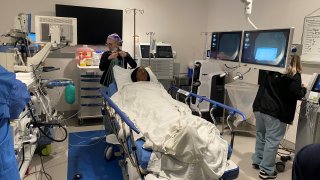
Dr. Ngozi Ezike, Illinois' former top doctor, invited NBC Chicago to witness her first screening colonoscopy, a procedure used to check for colorectal cancer, which is hitting the African American community hard.
“African Americans have a 20% higher chance of developing colon cancer, and then a 40% higher rate of mortality,” said Ezike, the CEO of Sinai Chicago and former director of the Illinois Department of Public Health.
Ezike, 51, and her gastroenterologist Dr. Ali Haider say colon cancer doesn’t have to be deadly, and tried to spread awareness by publicizing Ezike's procedure Monday.
“Preventable. Treatable. Curable. That’s the most important takeaway,” Haider said, emphasizing that early detection is crucial.
Feeling out of the loop? We'll catch you up on the Chicago news you need to know. Sign up for the weekly Chicago Catch-Up newsletter here.
“The toughest part about getting a colonoscopy is taking the prep the night before. Once you make it to the colonoscopy day, it's smooth sailing,” Haider said.
Ezike exclusively invited Health and Wellness reporter Lauren Petty to film her screening procedure on Monday. She also provided a look at the at-home preparation she had to undergo the night before by sharing cell phone videos of each step.
“I’m filling the laxative prep now,” Ezike said in one video, which shows her standing in front of a refrigerator.
Health & Wellness
In another video also filmed in her kitchen, she was drinking the laxative solution, “about 8 ounces every 10 minutes it’s not that bad actually,” Ezike said.
“It was an active night, but it was totally doable. And for what we're trying to get done, it's so worth it,” Ezike said.
Screening is recommended for someone at average colorectal cancer risk starting at age 45, but the American Cancer Society says only about 20% of people age 45-49 get screened.
“I don't think people know that it starts at age 45. And it could be younger with a family history of colon cancer,” Ezike said.
The procedure itself is painless. With the patient under anesthesia, a scope is used to assess the entire colon.
During Ezike’s approximately 30-minute procedure, Haider removed two small polyps, which are then sent out for evaluation. Haider saying he expects Ezike won’t be due for another colonoscopy for, “most likely seven to 10 years.”
Haider said he was impressed by Ezike’s willingness to share her experience.
“She really, you know, leads by example, in our community,” Haider said.
Ezike said this is part of her mission to help Sinai Chicago’s patient population, which is 50% African American.
“If we want to really narrow these disparities that we keep talking about between the communities that Sinai serves and other communities in Chicago, it really starts with some of these important preventive and screening procedures,” Ezike said.



